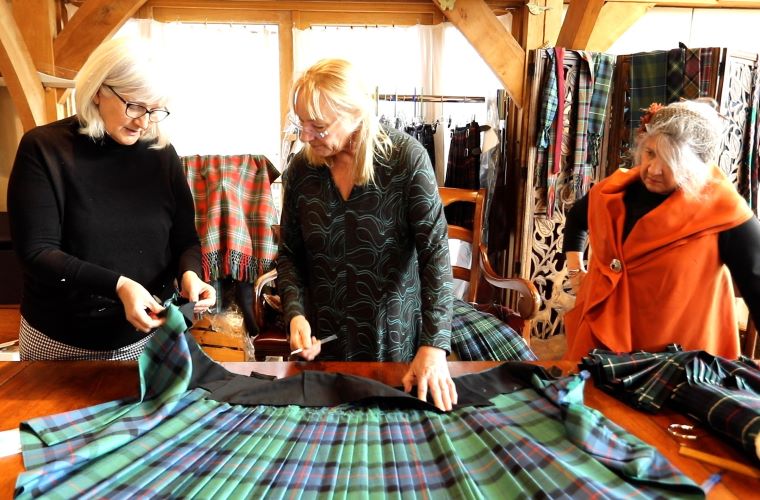
Marion Foster is the owner of Askival of Strathearn studio in Perthshire, Scotland. Along with crafting kilts herself, she also teaches others the art via online courses and in-person workshops as the co-owner of The College of Master Kilt Tailors.
“Most of what I am about is finding solutions for all the challenges I faced during my own development,” she shares with Celtic Life International via email.
Foster has had a passion for textiles since she was a youngster. As a teen, she made her first kilt as part on her Cub Scout uniform. Qt that time, however, she found little in the way of kilt-making guidance and instruction. Later in life she was mentored by a retired tailor, “which developed my tailoring skills and enabled me to appreciate the difference between tailoring and sewing.”
Although her interest in kilts endured, textiles were not a part of Foster’s initial career path: she first worked as a radiographer, later taking on other roles for the U.K.’s National Health Service (NHS).
“There came a point when I wanted a new chapter in my life; time to focus on developing my knowledge and skill in the craft of kilt making and to pass on all I know. I cherish the craft of kiltmaking and wanted to be the best I could.”
In 2009, Foster moved to her current home and built a workshop.
“I brought my trainer to the new space to deliver master classes to local students and I benefited from this, also, as it enabled me to continue learning while considering the constraints of locality, affordability, and professional and personal lifestyle.”
By 2015, she was ready to take the full-time leap into her new vocation.
“I pulled in my NHS pension and set up Askival of Strathearn and the Kilt College,”

Knowing both the accessibility and affordability challenges of kiltmaking firsthand, she set out to resolve those issues.
“Askival of Strathearn’s main mandate is raising awareness of – and safeguarding – the craft, and preserving the highest quality of the remarkable traditional attire of Scotland’s cultural heritage by sustaining craftmanship and sharing knowledge. As the demand for Highland dress increases, we recognize the need to offer accessible prices and profit which require ways to reduce production cost.”
While she isn’t advocating for the original style and quality standards to be things of the past, Foster wants to make sure that “those who love the Highland attire and wish to wear it” are aware of the different markets available. If someone wants a high-end heirloom kilt, for example, they should know exactly what they are looking for and where to find it. By making the craft more accessible, she aims “to ensure the knowledge and the skill never die out.”
She says they see a wide range of students at the Kilt College: from those interested in kiltmaking as a hobby, to others seeking professional development. “The students come from overseas and all over the U.K. and now even more overseas students can access our comprehensive training online.”
Both Askival of Strathearn and The Kilt College have grown in reputation and number of staff since their inception. Some past trainees are now members of the core team.
“We are a group of skillful, enthusiastic people who are driven by the love of our heritage, craft, developing expertise and humanity. We design tartans and source or organize special weaves for tartans that are not readily available. We are learning new skills to fulfill the requests of our customers, because their requests are often not financially viable to businesses where profit is a high priority.”
Foster adds that customers are involved in the planning process when it comes to custom kilts, and she encourages them to discuss their aesthetic preferences so the kilt will be made to their liking. In addition to creating new bespoke kilts, she and her team are often asked to alter or restore old kilts. She notes the importance of taking the customer’s personal attachment to the kilt into account, and the results are rewarding.
“This brings such emotional pleasure to people who could not see how their scruffy, ancient kilt belonging to previous generations can be worn again with pride.”
As her ventures expand, Foster’s main goal remains the same: “to ensure the craft of the tailored kilt is safeguarded, respected, and known globally.”




















Leave a Comment